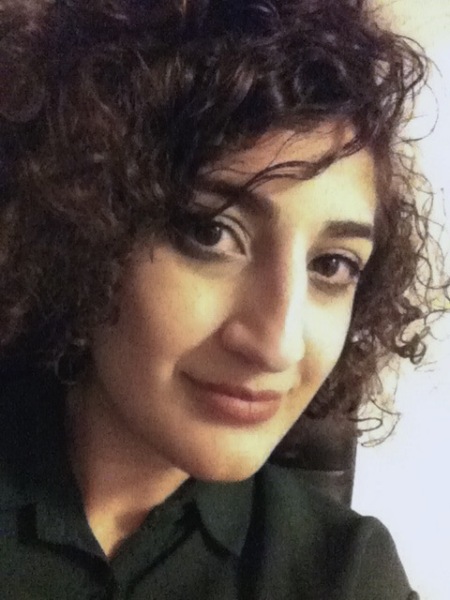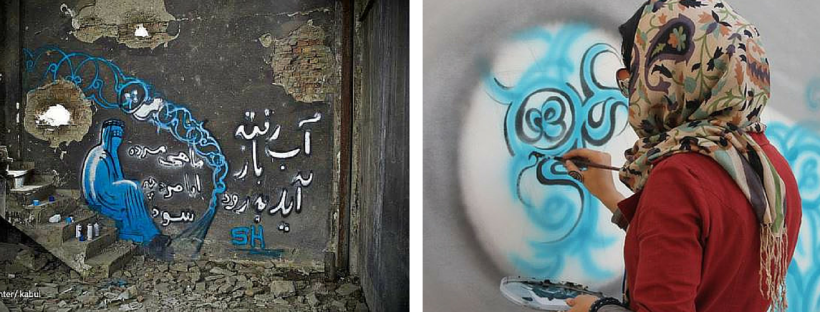Our Work – Interview/Conversation with Paniz Musawi Natanzi
ART & GEOPOLITICS: A CONVERSATION WITH PANIZ MUSAWI
by Gabriel Ouzounian
HAYP’s newest exhibit Lips of Pride is coming up quickly, and our special guest speakers are starting to arrive.
One of our most exciting visitors is Paniz Musawi Natanzi, a Researcher who will discuss feminist art from a geopolitical perspective. Musawi, who currently studies in the UK as a PhD candidate, researches the relationship between geopolitics and art history, especially in the realm of spaces of war and conflict.
THE GEOPOLITICS OF ART IN AFGHANISTAN & PAKISTAN
Her interest in cross analyzing the two fields began during her Masters of Science at the School of Oriental and African Studies at the University of London, where she said she tried to rethink women’s empowerment by doing a “bottom-up” analysis of contemporary art in Afghanistan and Pakistan.
Digging deeper into historical Afghan visual art, Musawi was excited to find the presence of women artists. Yet she began to feel skeptical after seeing the level of sensationalism that surrounded female artists in the country.
“Why did international and local organizations primarily support young women artists?” she asked, “But it seems quite obvious why, when you consider the history of politics of gendered violence against women in Afghanistan.”
She began to focus on the idea that women’s rights can serve as a tool to justify geopolitical intervention, in both a progressive and detrimental way. An example of this was in 2004 when Rahraw Omerzad, an artist, curator and lecturer at Kabul University, opened the Centre for Contemporary Art Afghanistan (CCAA) – the first space for contemporary art in Kabul primarily for women. In 2008 the CCAA organized the first Female Painting and Modern Painting Exhibition, which was funded by the Women of the World Foundation.
Many of the artists, who were between the ages of 16 and 25, did not have an artistic education because they were not allowed to attend school or university during the Taliban rule from 1996 to 2001. Musawi said that the presence of international organizations and individuals in Kabul ensured an audience and funding to promote the event in not just a cultural light, but also as a way to promote women’s legal rights in a war-torn capital. This is one of the ways how international powers continued their justification for presence in Afghanistan.
“As post-colonial feminists have argued, the military invasion and ongoing colonial presence in Afghanistan was framed, in this way, as a mission to rescue women in Afghanistan from the repression of the Taliban,” she said, citing British academic Derek Gregory. “Gregory explains that colonial presence is not just shaped through political and legal action, but also by influencing cultural practices. The works of these young and emerging artists, male and female, engaged with traumas of war and conflict, repression, fear and hope. These topics did not just tell something about the experiences and wishes of the art-makers, but also what the funders expected to see – misery and gender-based violence.
“So I think this phenomenon shows how intertwined visual art and politics can be.”
VISUAL ARTS AS AN ALTERNATIVE SOURCE OF REPRESENTATION
Musawi’s research examines to what extent visual arts can serve as a tool undermining and reproducing images and ideas of Afghanistan..
“To me, visual arts are a way to materialise the experience of war, conflict, gender-based violence, migration and diaspora,” she said. “I examine visual knowledge production in order to analyze alternative sources of representation apart from textual knowledge production. A postcolonial feminist approach allows us to see an overview of local practices, gender relations and gendered spaces that compliments a feminist analysis of the geopolitics of the region.
“This, in turn, opens critical potential to research knowledge production in spaces where stereotypes marginalized diversity and the complexity of life. It gives agency to people who have traditionally always been represented by white European or US-American journalists, researchers or filmmakers.”
Musawi related Armenian history with that of Afghanistan, especially in the context of brutal racist politics and the post-Soviet era. As domestic violence moved from the private to the public sphere in post-socialist Armenia, a contrast was formed with the grassroots movement against domestic violence in countries like the United States. Because of this, this discussion in Armenia was perceived as imposed by western feminists, international organizations, and donors that were present in the 1990s. Both Armenia and Afghanistan have a history of women activism, but in both cases no organically grown discussion about gender-specific rights formed. Instead, western-informed organizations and groups implemented their views on women’s rights as universally applicable in order to “save” passive female victims from male violence.
“As in Afghanistan, Armenia has the legal framework that grants equality among women and men, but the implementation is not possible as long as people, men and women, do not recognize the law,” she said. “Armenia shares in this regard with Iran that there are many women in politics and public figures that perceive feminism as a neoliberal western phenomenon, which colonises and poisons women’s minds to break free in a society where family is the most precious formation. So the dilemma is that geopolitical interests lead international actors to intervene into states not just politically and economically but also culturally, and this cultural intervention has neither in Afghanistan, nor in Armenia been thought through by organisations such as USAID, the US state department and the many other international NGOs.”
In her research, and understanding of this phenomena, Musawi said she has to become familiarised with local practices, rituals and laws in order to address gender-specific issues without causing new problems for the local activists. This is because western feminism is not a universally applicable ideal, in that one type of feminism from one region will not be appropriate in another. Musawi argues that trying to apply the western ideal of feminism in a country like Armenia can be treated as alien, inappropriate, and un-Armenian.
By working with local activists, and having knowledge of local customs, traditions and history, creating a feminism that will fit a specific region becomes possible. This is why embodied experiences, as seen through the visual art of local advocates for gender rights, is so important.
“We need transnational awareness and exchange especially regarding gender-specific issues in a region where we can observe similar challenges for feminists who try to improve women’s livelihoods without neglecting local ideas of gender relations,” she said.
“WE HAVE TO NEGOTIATE WITH PATRIARCHY IN OUR EVERYDAY LIVES AND WHY SHOULDN’T WE TRY TO DO THIS TOGETHER, FOR INSTANCE, THROUGH VISUAL ARTS? WHAT DO WE HAVE TO LOSE WHEN WE INTRODUCE REGIONAL ARTISTS TO EACH OTHER AND TO OUR LOCAL COMMUNITIES AND TALK ABOUT THE WORKS WITH THE ARTISTS?
“In this way, we are not alone in our struggle against patriarchal attitudes that try to tell us that so many things we do and are are ‘shameful.’”
MORE ABOUT MUSAWI
 Musawi is a PhD candidate at the Center for Gender Studies at the School of Oriental and African Studies (SOAS) at the University of London. She is currently a scholarship holder of the Heinrich Böll Foundation in Germany.
Musawi is a PhD candidate at the Center for Gender Studies at the School of Oriental and African Studies (SOAS) at the University of London. She is currently a scholarship holder of the Heinrich Böll Foundation in Germany.
She said that she began taking an interest in Gender Studies, inequality and gender-specificity because of her experiences in school, her time spent studying abroad, and simply growing up as a women.
“I think that we live in a world where we constantly are being gendered from the moment we are born by the law and the people we grow up with,” she said. “I remember my time in grammar school when we played soccer “boys against girls” or later on during puberty when people started to tell me that I should behave like a ‘lady’ and put on nail polish and wear skirts and dresses or not sit with my legs open like a man, because it is “shameful”. In school some of my male fellow students started to call me a feminist, but for them it was a derogatory term that described annoying women who speak too much.”
She started her academic career at the Free University of Berlin, where she achieved her BA in Political Science. It was during this time that she elected to spend a term abroad in Beirut, where she started to have a more in-depth experience with “feminist and queer” theories. These theories, coupled with her life experiences, drew her to study postcolonial feminism.
“These theories enabled me to analyze and frame embodied gendered experiences and also learn that gender does not necessarily need to be a category that determines my place in society,” she said.
Following her term abroad, she found herself frustrated with the lack of postcolonial studies and critical perspectives into the history of contemporary politics of migration and diaspora at the Free University of Berlin. This prompted her departure from Berlin to London.
“I felt alone with my other students whom I met in the Colloquium of Colour in Berlin in the summer of 2013,” she said. “My second supervisor for the BA, who had worked for quite a while on (French philosopher and historian) Michel Foucault’s discourse analysis, got really mad at me for arguing that Foucault was an Orientalist. The event made it easier for me to leave Berlin and go to London where I did not have to constantly justify why gender, colonial and imperialist history and politics matter, but instead could develop my argument.”
During her time at the University of London, she completed her MSc in Comparative Political Thought at SOAS. She continues her work there today.

